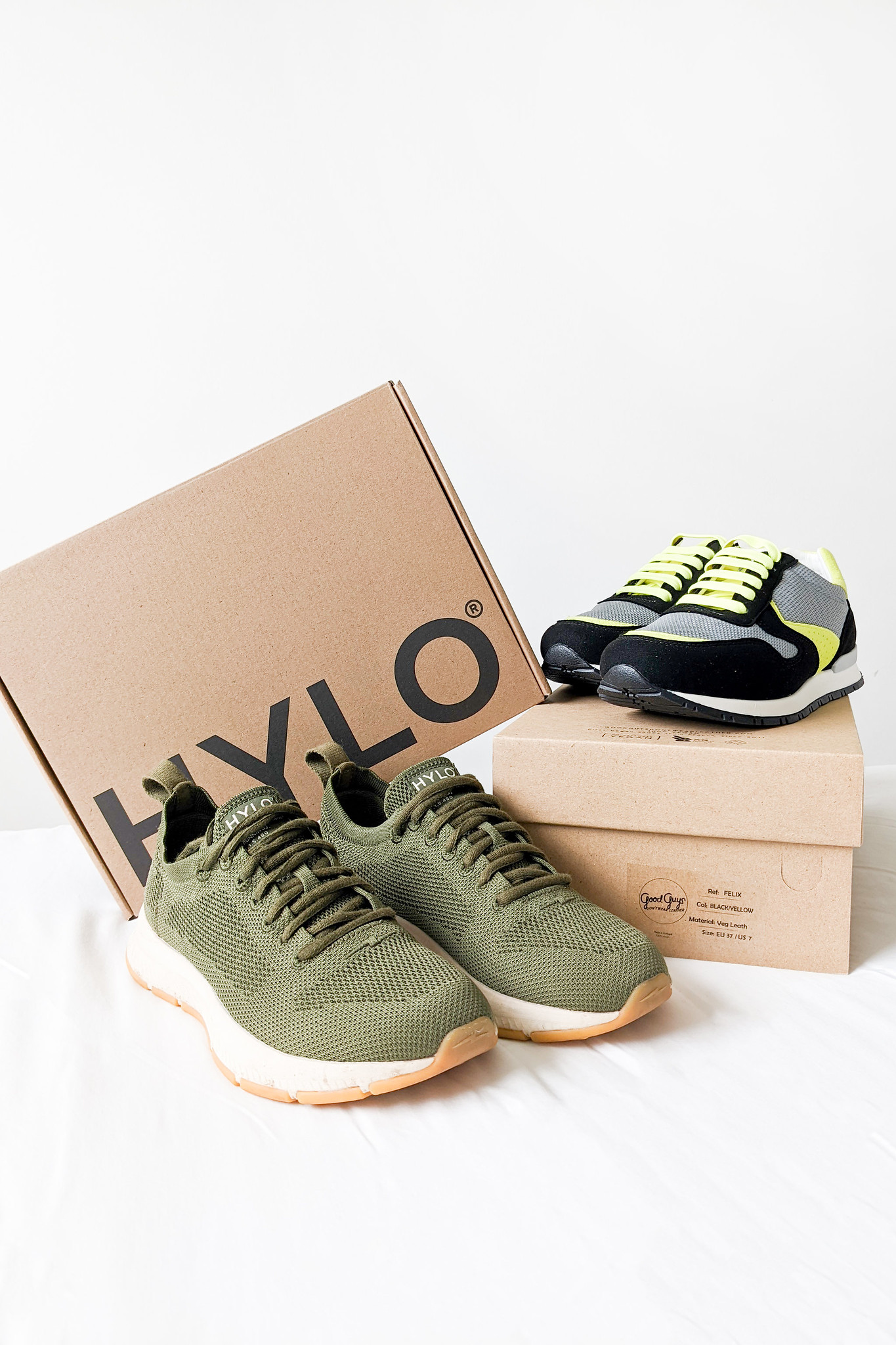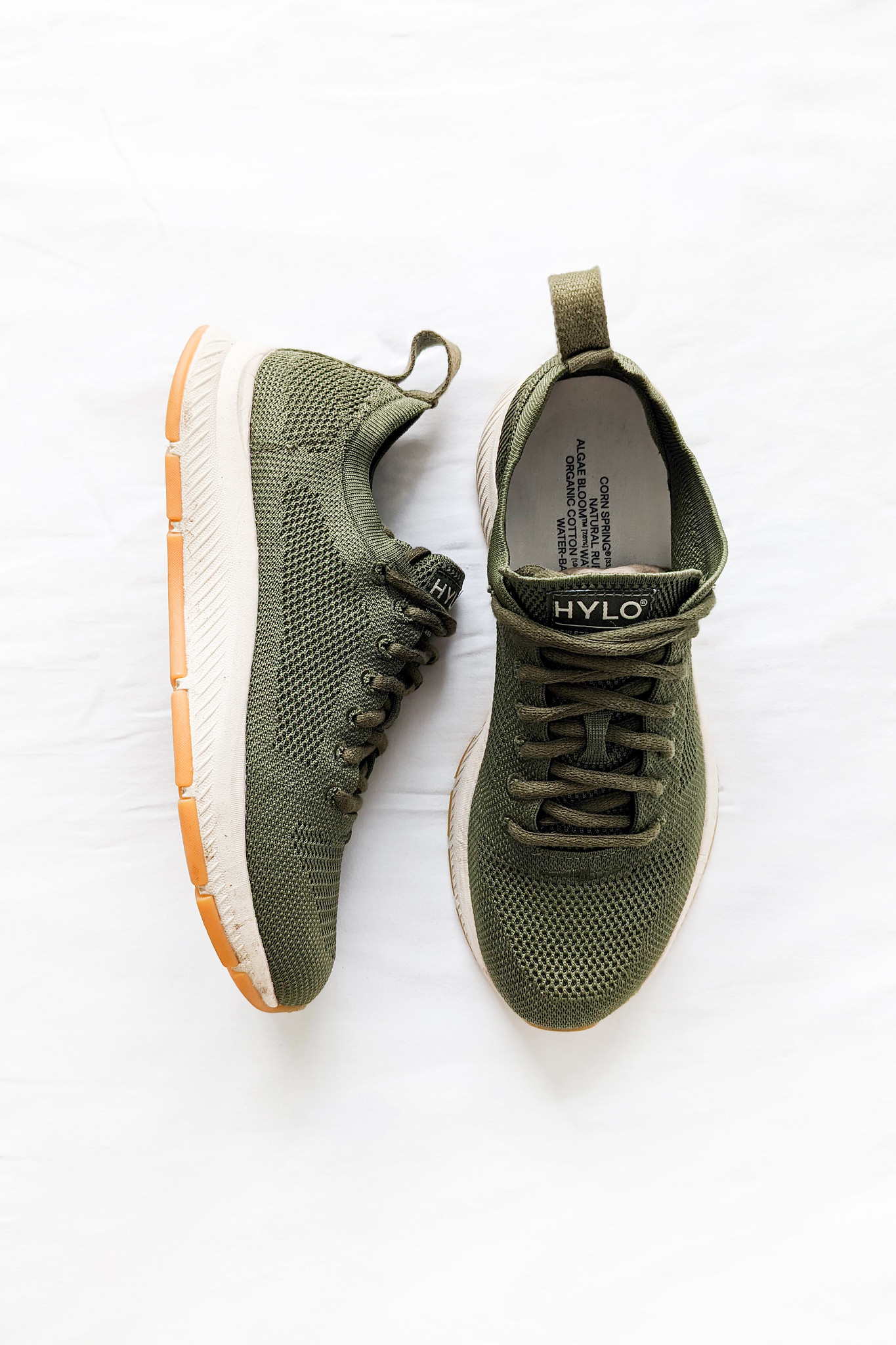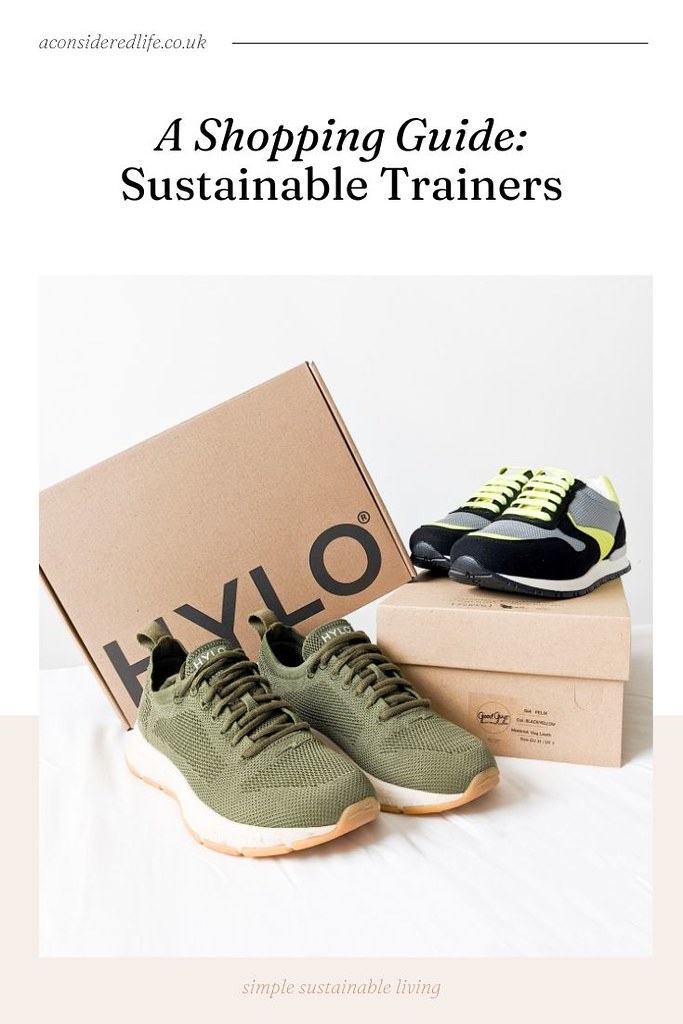
If you have a small but well-loved selection of footwear, chances are they wear out quicker than anything else in your wardrobe. Trainers take a beating, particularly if you do a lot of exercise. So it's important to know where to buy your next pair before you need to start shopping for them.
This shopping guide for sustainable trainers focuses on everyday sneakers. The kind you can wear around the city and on long dog walks. Some are suitable for more vigorous exercise, others are not. Take notes.
What are 'sustainable trainers'?
There's no protected definition of 'sustainable' so brands are free to deem the products they make to be 'sustainably-made'—even when they're not. Greenwashing is a huge problem for consumers wanting to make better choices about where they spend their money. Whether you consider a product sustainable or not really does depend on your personal values, and what you want to prioritise.
I expect brands to provide information on where their products were made, who made them, and how those workers were treated. There needs to be transparency within the supply chain, slow production, and ideally a take-back programme of some sorts. They need to be making vegan-friendly footwear too. We're at the point now where non-plastic leather alternatives are available, and brands should be investing in them to make these alternatives more affordable.
The leather industry is exceptionally harmful to the planet being one of the most toxic processes in all of the fashion supply chain. Workers and the local communities are exposed to harmful substances that cause health issues and pollute waterways. It's nearly impossible to reclaim these pollutants, and the chemicals used to tan leather are not biodegradable. Over 50 million animals suffer and die for the fashion industry. So our choice on where to shop and what to buy really does influence change.
Where to Buy Sustainable Trainers
Investing in a pair of good quality shoes, taking care of them, and wearing them for as long as possible is the most sustainable way to shop. Choose a pair that is season-less rather than trend-led from a brand that prioritises people, the planet, and animals. After a lot of searching, these are the best sustainable shoe brands to buy your next pair of trainers from.
Pre-Owned
I know some people feel queasy about thrifting shoes. Let me reassure you, there are plenty of second-hand trainers that are barely worn or brand new in their box. I thrifted a pair of nearly-new Nike Air Force Max 90s on eBay. They've been the only pair I've owned (and worn to death) until recently. Thrifting them meant I could test out whether there is space in my wardrobe for trainers without wasting money on expensive new shoes. Follow my thrifting tips and avoid heavily-worn footwear.

Good Guys Don't Wear Leather
The entire range of Good Guys products are vegan-friendly, making this brand a good choice if you want to prioritise avoiding animal exploitation. The use of local manufacturing and eco-friendly materials helps reduce their carbon footprint too. They provide lots of information on the materials they use, as well as their production methods.
If you're looking for playful footwear, Good Guys have some of the best colourways. Namely these retro running shoes in hot pink and teal. The brand gifted me a pair of the lime green and black trainers for review.
These trainers are sturdy yet supportive, meaning they fit well and feel comfortable. Best suited to urban strolls, these are the trainers I grab when dog walking in the city. The vegan suede material gives the shoe quite a stiff, structured build, which I expected would require breaking in. None was needed, and these trainers remained comfortable for the daily 3 mile walks I take with the dog.
Good News
Good News prioritises their environmental impact by using eco-friendly materials, recycled packaging, and Bluesign certified textile dyes. This keeps the amount of chemicals and water used in production to a minimum. The trainers are made from sustainable and partially recycled materials, including recycled gym mats, natural rubber, and organic cotton.
However, I'm uncomfortable with the brand's choice to collaborate with H&M. Although an argument could be made that this decision allows for sustainable trainers to be more readily available on the high street; I'm not convinced this is the way to go about it. Especially when Good News itself provides insufficient information about its labour policies.
Hylo Athletics
The Hylo Athletics range of trainers are designed for sports, and made using organic cotton, corn fibres, algae bloom. These locally-sourced renewable and recyclable materials have a carbon footprint that is '52% smaller than the average running shoe.' Hylo provide information on their materials and suppliers. But nothing about textile waste or water reduction.
I was gifted a pair of the Hylo Run 2 trainers for this review. Their sizing tool made choosing the right fit quick and easy. As soon as these arrived, I went on a 5 mile walk and experienced zero issues with wear-in. I could feel the springiness of the natural rubber and corn spring sole as I walked, keeping me light on my feet. It was a hot day but the lightweight corn fibre upper and algae bloom insole meant the shoes were breathable and stayed comfortable.
Hylo proves there doesn't have to be a compromise on performance and comfort when choosing a more eco-friendly trainer. Their shoes are 100% recyclable with a recycling scheme giving you £10 credit towards a new pair when you recycle your old ones. If you use my link, you'll get £20 off your first order too, making them a great price.
LOCI
LOCI has a small selection of classic trainers, all of which are vegan-friendly. The brand claims to only make as many shoes as needed, which reduces the impact of manufacturing and the carbon footprint that produces. 10% of profits go toward several charities helping to care for our wildlife too.
The trainers themselves are made from a variety of eco-friendly fabrics, including recycled ocean plastic, natural rubber, bamboo, cork, and recycled brass. There are only a few styles to choose from but they do offer a range of colour-ways.

Pangaia
Pangaia's trainers are quite distinct in appearance. They are designed with a 'genderless fit' and made from reclaimed, upcycled materials, reducing their environmental impact. Organic cotton, natural rubber, and grape skins are repurposed from industrial waste and the winewaking industry. Any dyes are low impact and non-toxic, and the packaging is compostable.
Although Pangaia traces their supply chain and visits their suppliers regularly; they offer very little information about the payment of their workers. They do, however, provide quite extensive information on the science of their materials, and how they give back to charities.
Po-Zu
At the time of writing this guide, Po-Zu is incredibly limited in choice with only one option: a classic all-white low-cut sneaker. You do get to choose between four very slight variations though... The shoes are made from solvent-free "animal-friendly material", cork insoles, and organic cotton laces.
Po-Zu traces its supply chain, visits suppliers regularly, and workers are paid a living wage. So the combination of eco-friendly materials, minimal water waste, and renewable energy makes them a good choice if you're looking for a basic pair of trainers.
SAYE
SAYE has a limited choice of mostly-white sneaker designs with a few colours to choose from. They use bio-based and recycled materials to make them, and manufactures locally to reduce their carbon footprint. Not much information can be found on their website about labour practices or living wages.
These shoes are not waterproof and cannot be washed in your washing machine, which makes them more of a fashions statement than an exercise essential. If I'm honest, this puts me off recommending them. Above all else, I expect trainers to be practical.
Stella McCartney
A luxury choice, for sure. Stella McCartney makes some of the prettiest trainers I've come across. The peach Loop Lace-Ups are especially lovely, and come with glow-in-the-dark side panels and laces.
Stella McCartney has policies in place to prevent deforestation, and uses eco-friendly materials to reduce their carbon footprint. They're also 'committed to circularity' by using renewable and recycled materials.

Womsh
Womsh have a fantastic mix of classic trainers and running shoes with in their vegan-friendly range. Their trainers are made recycled PET nylon and Appleskin. They're waterproof and breathable so an ideal choice if you want a versatile pair of sneakers.
This brand does make leather shoes too so make sure you're browsing the vegan range if you're shopping with the intention of buying a new pair.
Veja
Arguably one of the most well-known sustainable trainer brands. Even people not interested in sustainability might own a pair simply because of their popularity. Veja use organic cotton and recycled materials to create their vegan range. They trace their entire supply chain, and ensure workers are paid a living wage.
The branding is very distinctive, which isn't to my taste. But they offer more variety than other sustainable trainer brands, and the colours are rather appealing. They've got everything from hi-tops to classic sneakers at a range of price points.
Vivo Barefoot
Vivo Barefoot focuses more on function than style. It's all about natural movement and stability. The vegan range is severely limited in options, and the product details are shockingly sparse. This lack of information has me raising an eyebrow.
There's no information on the payment of workers, or how often they visit their suppliers. They don't even list the materials on the product page. However, they do have a refurbished footwear programme. It's a great way to prevent waste and re-sell unwanted footwear.

